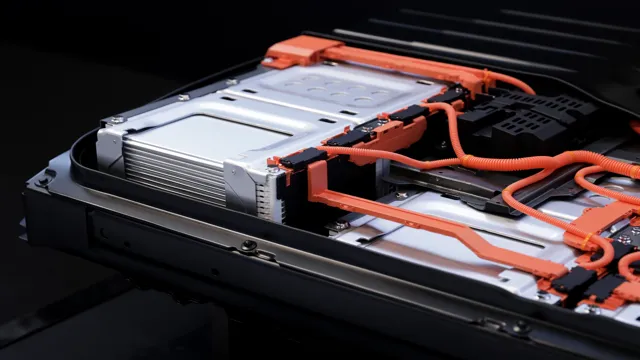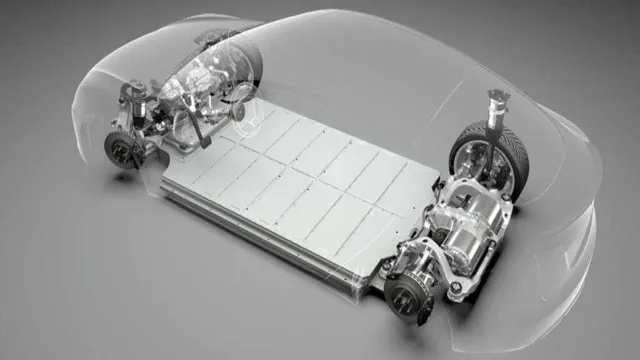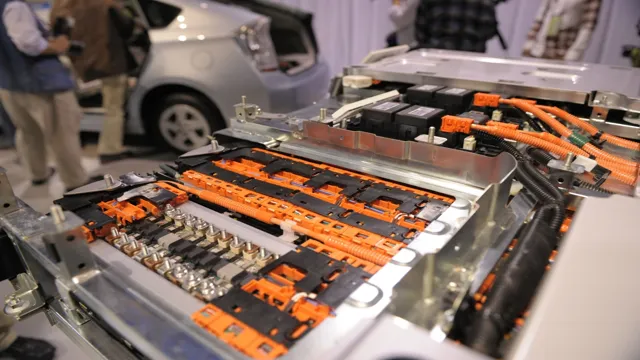Revolutionizing Mobility with Advanced Electric Car Lithium-ion Batteries
Electric cars are becoming increasingly popular as more people prioritize environmentally conscious choices. However, despite their obvious benefits, electric car batteries still have limitations that may be a concern for potential buyers. The range and charging time of electric cars are key factors that often influence people’s decisions.
But how do these limitations compare across different models and brands? In this blog post, we will explore data on electric car battery limitations to get a better understanding of the current state of this market.
Battery Life: How Long Can They Go?
When it comes to electric cars, one of the most common concerns is their battery life. Some people may worry that the limited range of electric vehicles could hold them back from enjoying long road trips, while others might find themselves hesitant to invest in one due to fears surrounding battery lifespan. However, the truth is that modern electric cars are designed to last well beyond the life of their original batteries.
While it’s true that lithium-ion batteries do have a finite amount of charge cycles, most electric cars are built to last for hundreds of thousands of miles, with battery warranties typically covering up to eight years or 100,000 miles. Plus, electric car owners can also take steps to maximize battery life, such as avoiding extreme temperatures and rapid charging whenever possible. So if you’re considering an electric car but are concerned about battery longevity, you can rest assured that modern technology has come a long way, and that you’ll likely be able to enjoy many years of reliable driving.
Real-world vs advertised mileage
Battery life is a crucial factor when it comes to electric vehicles. Despite manufacturers advertising high mileage per charge, the real-world mileage may vary greatly depending on factors such as weather, route, and driving habits. However, advancements in battery technology have enabled EVs to deliver impressive mileage ranges, with some surpassing the 300-mile mark on a single charge.
While this may seem impressive, it’s important to remember that driving conditions can significantly impact range. For example, extreme hot or cold weather can drain the battery faster, reducing the mileage range. Additionally, driving at high speeds or on hilly terrain can also affect the range.
Nonetheless, with more charging stations being installed and battery technology advancing rapidly, electric vehicles are becoming a more viable option for everyday transportation.

Effects of temperature on battery
One of the biggest factors that affect battery life is temperature. In general, high temperatures will shorten battery life while low temperatures may extend it. This is because high temperatures cause the battery to degrade more quickly, which means it will have a shorter lifespan overall.
On the other hand, low temperatures can slow down the chemical reactions inside the battery, which can prolong its life. For example, if you leave your phone or laptop battery in the car on a hot day, you may notice that it drains much faster than usual. This is because the heat is causing the chemical reactions inside the battery to speed up, which causes it to lose power more quickly.
Similarly, if you keep your phone in a cold environment, such as a freezer, you may notice that the battery lasts longer than usual. This is because the cold temperature slows down the chemical reactions, which means the battery holds its charge more effectively. So, if you want to extend the life of your battery, it’s important to keep it at a moderate temperature as much as possible, avoiding extreme heat or cold.
Charging Time: How Fast Can You Get Back on the Road?
One of the biggest limitations for electric cars is their battery life and the time it takes to charge them. Depending on the make and model, an electric car’s battery can last anywhere from 100 to 300 miles before needing to be recharged. However, charging times can vary greatly, with some electric cars taking only 30 minutes for an 80% charge and others taking several hours for a full charge.
The issue with long charging times is that it limits the car’s range and potential for longer trips. It’s important for electric car owners to plan ahead and make sure they have enough time to fully recharge their vehicles, especially if they’re traveling long distances. As advancements in technology continue to be made, it’s likely that electric car batteries will become more efficient and charging times will become shorter, making these eco-friendly, cost-effective vehicles even more appealing to the masses.
Comparison of charging options
When it comes to charging an electric vehicle, buyers should consider the different charging options available and how they can affect the time it takes to get back on the road. The charging time of an electric car depends on the size of its battery, the power capacity of the charging station, and the type of charger being used. Level 1 chargers, which use a standard 120-volt household outlet, can take up to 24 hours to fully charge a vehicle, making them best suited for overnight charging.
Level 2 chargers, which operate at 240 volts, can charge a car much faster, with most EV’s being fully charged within 3-8 hours. For even faster charging, Level 3 DC fast charging can bring a battery up to 80% capacity in as little as 30 minutes, which becomes very useful when on road trips or long distances. It’s important to note that not all electric cars can use Level 3 charging, so drivers should check with their manufacturer before attempting to use these high-powered charging stations.
When selecting a charging option, it’s crucial to take into account the vehicle’s driving range, charging capabilities, and the driver’s daily routine to determine which charging option is most practical.
Charging time vs range
When it comes to electric vehicles, charging time is a crucial factor. Nobody wants to sit around waiting for their car to charge for hours on end. Fortunately, advances in technology have made fast charging more accessible than ever before.
Depending on the vehicle and charging station, it’s possible to get an 80% charge in just 30 minutes or less. However, it’s important to keep in mind that charging time can vary depending on several factors, such as the battery size and capacity, the temperature outside, and the type of charging station being used. So while it’s tempting to focus solely on charging time, it’s also important to consider the range of the vehicle.
After all, what good is a fast charge if you can only go a few miles before needing to charge up again? In the end, the ideal scenario is a balance between fast charging and a decent range, ensuring that drivers can get back on the road quickly without sacrificing their ability to cover long distances.
Charging infrastructure availability
When it comes to electric vehicles, one of the most common concerns is charging time. How fast can you get back on the road after depleting your battery? The answer depends on the charging infrastructure availability. More and more charging stations are cropping up all over the world, but the availability is still not as widespread as traditional gas stations.
However, advancements in technology mean that charging times are continually decreasing. For example, Tesla’s supercharger network can provide a full charge in around an hour, while some newer electric vehicles can charge up to 80% in as little as 30 minutes. Of course, this still means that drivers need to plan their trips around charging stations, but as the infrastructure and technology continue to evolve, electric vehicles will become an even more attractive option for drivers.
Cost: Are Electric Cars Worth the Investment?
When considering the cost of purchasing an electric car, it’s important to factor in the cost of the batteries. While electric cars may have a higher initial cost than their gas-powered counterparts, their long-term cost benefits can make up for it. The cost of batteries has come down significantly in recent years, and with advancements in technology, the lifespan of batteries has increased as well.
Additionally, owning an electric car can save money in the long run with lower fuel and maintenance costs. Plus, there are rebates and tax incentives available for electric car owners, further increasing the cost savings. While the investment in an electric car may seem daunting at first, the cost benefits and the positive impact on the environment make it a worthwhile investment.
Total cost of ownership
When considering purchasing an electric car, one major factor to take into account is the total cost of ownership. While electric cars may have a higher upfront cost, the long-term savings can be substantial. Not only do electric cars have lower fuel costs, but they also have lower maintenance costs due to fewer moving parts and no need for oil changes.
Additionally, many governments offer incentives and tax credits for purchasing electric vehicles, further reducing the overall cost. It is important to do the research and consider factors such as charging infrastructure availability and the range of the car before making a decision. Overall, while electric cars may seem like a hefty investment, the potential savings in the long run can be well worth it.
Comparison of electric vs gas expenses
Electric vs Gas Expenses When it comes to the cost of owning a car, one of the biggest factors to consider is fuel expenses. Electric cars have gained popularity in recent years due to their lower environmental impact and potential long-term savings. While electric cars may have a higher upfront cost, they can save you money in the long run.
According to the U.S. Department of Energy, the average cost of electricity in the United States is about 13 cents per kWh, while the average price of gasoline is currently around $3 per gallon.
This means that driving an electric car can cost significantly less per mile than driving a gas-powered car. Of course, the exact cost will depend on a variety of factors such as the specific make and model of the car, the driving conditions, and the cost of electricity and gas in your area. However, for those who are looking to save money on their transportation expenses and decrease their carbon footprint, an electric car may be a wise investment.
Conclusion: Should You Buy an Electric Car?
In conclusion, while electric cars have undoubtedly revolutionized the automotive industry, the limitations of current battery technology remain a pertinent obstacle to their widespread adoption. However, as with any emerging technology, innovation and progress are key. With continued research and development, it is possible that electric car batteries will one day surpass the limitations we face today, ushering in a truly sustainable and electrified future.
Until then, let us embrace the electric car for its many benefits, while acknowledging its limitations and working towards solutions to overcome them. After all, every revolution has its setbacks, but those who persevere reap the greatest rewards.”
FAQs
What is the lifespan of an electric car battery?
The lifespan of an electric car battery varies, but typically it can last between 5-10 years or more depending on usage and maintenance.
Can electric car batteries be recycled?
Yes, electric car batteries can be recycled. In fact, many automakers have established programs to recycle old batteries and recover valuable materials.
Are there any limitations to driving an electric car in cold weather?
Yes, electric car batteries may experience decreased range and performance in cold weather. It is recommended to keep the car plugged in and pre-conditioned before driving in colder temperatures.
Do electric car batteries require routine maintenance?
Yes, electric car batteries require routine maintenance such as keeping them charged and avoiding extreme temperatures. It is also important to have them checked periodically by a professional.






